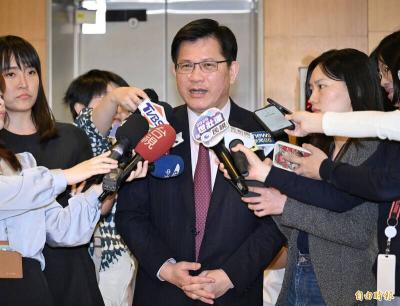Democratic Progressive Party (DPP) Chairman Yu Shyi-kun's comments on Thursday announcing the Chinese-language China Times as persona non grata and to which the DPP would deny access drew a mixed reaction from legislators yesterday.
DPP caucus whip Ker Chien-ming (
"Chairman Yu has a personal grievance with the China Times, but that should not be elevated to party level," Ker said. "We 100 percent respect freedom of the press, but we also hope the press maintains impartiality."
Yu declared the boycott on Thursday after he appeared in court for a defamation lawsuit against the paper after it claimed that Yu used the term "Chinese pigs" to refer to anti-President Chen Shui-bian (陳水扁) protesters in a front page story on Sep 25.
Although the paper later acknowledged the accusation made in its story was groundless, Yu did not withdraw the lawsuit.
Yu criticized the paper's editor-in-chief, Wang Chien-chuang (王健壯) for making it a "mouthpiece" of the Chinese Nationalist Party (KMT).
The DPP late on Thursday night issued a statement to elaborate on Yu's comments.
It said Yu's action against the China Times was aimed at the paper's "twisted guiding principles resulting from political and economic interests" and that "it was not an attempt to deny journalists' rights to work."
"The China Times has lost its objectivity because of meddling in political wrangles," the statement said.
It added that Yu's announcement was in line with the party's platform to safeguard press freedom.
DPP Legislator Gao Jyh-peng (
DPP Lawmaker Cheng Yun-peng (鄭運鵬) said that while he personally would not refuse to be interviewed by the paper, the boycott could serve as a warning for the paper to engage in some introspection.
Chinese Nationalist Party (KMT) Chairman Ma Ying-jeou (
"I believe that many politicians have mixed feelings about the press, but the media is, after all, the Fourth Estate, which is an important tool to guarantee diversity in a democratic society," Ma said, adding that he believed Yu had overreacted.
When asked by the press to comment, Legislative Speaker Wang Jin-pyng (王金平) said he felt awkward discussing the matter.
"Whatever I say would be interpreted as a criticism of [Yu]," Wang said.
Wang said Yu's action was understandable, but he added that he would not do the same thing if he were Yu.
"I was often [misunderstood] by the press," Wang told reporters. "You often made a fuss over what I said, but I chose to leave it at that."
KMT lawmakers were less than tactful in their comments on Yu, blasting his announcement as akin to "political terrorism."
"Yu stifles free speech," KMT Legislator Tsai Chin-lung (
KMT Legislator Lin Te-fu (
The KMT lawmakers asked Yu to revoke his announcement, which they said would do "harm to the country's democracy and the public's right to know."
also see story:
Editorial: Yu slaps himself in the face

Taiwan would welcome the return of Honduras as a diplomatic ally if its next president decides to make such a move, Minister of Foreign Affairs Lin Chia-lung (林佳龍) said yesterday. “Of course, we would welcome Honduras if they want to restore diplomatic ties with Taiwan after their elections,” Lin said at a meeting of the legislature’s Foreign Affairs and National Defense Committee, when asked to comment on statements made by two of the three Honduran presidential candidates during the presidential campaign in the Central American country. Taiwan is paying close attention to the region as a whole in the wake of a

Chinese Nationalist Party (KMT) Chairman Eric Chu (朱立倫), spokeswoman Yang Chih-yu (楊智伃) and Legislator Hsieh Lung-chieh (謝龍介) would be summoned by police for questioning for leading an illegal assembly on Thursday evening last week, Minister of the Interior Liu Shyh-fang (劉世芳) said today. The three KMT officials led an assembly outside the Taipei City Prosecutors’ Office, a restricted area where public assembly is not allowed, protesting the questioning of several KMT staff and searches of KMT headquarters and offices in a recall petition forgery case. Chu, Yang and Hsieh are all suspected of contravening the Assembly and Parade Act (集會遊行法) by holding

President William Lai (賴清德) has appointed former vice president Chen Chien-jen (陳建仁) to attend the late Pope Francis’ funeral at the Vatican City on Saturday on his behalf, the Ministry of Foreign Affairs said today. The Holy See announced Francis’ funeral would take place on Saturday at 10am in St Peter’s Square. The ministry expressed condolences over Francis’ passing and said that Chen would represent Taiwan at the funeral and offer condolences in person. Taiwan and the Vatican have a long-standing and close diplomatic relationship, the ministry said. Both sides agreed to have Chen represent Taiwan at the funeral, given his Catholic identity and

Taiwan would welcome the return of Honduras as a diplomatic ally if the next president of that country decides to make such a move, Minister of Foreign Affairs Lin Chia-lung (林佳龍) said today. “We would welcome Honduras if they want to restore diplomatic ties with Taiwan after their elections,” Lin said during a legislative hearing. At the same time, Taiwan is paying close attention to the Central American region as a whole, in the wake of a visit there earlier this year by US Secretary of State Marco Rubio, Lin said. Rubio visited Panama, El Salvador, Costa Rica and Guatemala, during which he